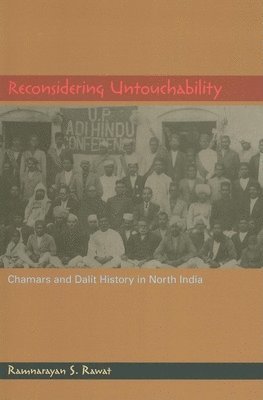
- Format
- Häftad (Paperback / softback)
- Språk
- Engelska
- Antal sidor
- 298
- Utgivningsdatum
- 2011-03-23
- Utmärkelser
- Winner of Winner of the Joseph W. Elder Prize in the Indian Social Sciences, American Institute of Indian StudiesHonorable Mention, Association for Asian Studie.; Winner of Winner of the Joseph W. Eld
- Förlag
- Indiana University Press
- Illustrationer
- 11 b&w illus., 1 map
- Dimensioner
- 219 x 188 x 22 mm
- Vikt
- Antal komponenter
- 1
- Komponenter
- 23:B&W 6 x 9 in or 229 x 152 mm Perfect Bound on White w/Gloss Lam
- ISBN
- 9780253222626
- 440 g
Reconsidering Untouchability
Chamars and Dalit History in North India
- Skickas från oss inom 5-8 vardagar.
- Fri frakt över 249 kr för privatkunder i Sverige.
Passar bra ihop
De som köpt den här boken har ofta också köpt Knife av Salman Rushdie (inbunden).
Köp båda 2 för 590 krKundrecensioner
Fler böcker av Ramnarayan S Rawat
-
Dalit Studies
Ramnarayan S Rawat, K Satyanarayana
The contributors to this major intervention into Indian historiography trace the strategies through which Dalits have been marginalized as well as the ways Dalit intellectuals and leaders have shaped emancipatory politics in modern India. Moving b...
Recensioner i media
"Reconsidering Untouchability overall stands as an authoritative challenge to conventional accounts of Dalit history." American Historical Review "This engaging historiography of Dalit identity in the nineteenth and twentieth centuries in northern India is a significant contribution to understanding the situation of the "untouchables" in Indian society as a whole." Bulletin of the School of Oriental and African Studies "Rawat's Reconsidering Untouchability is a valuable addition to [the] recent tradition of caste interpretation... [He] elicits from the history of the Chamars of... Uttar Pradesh a historiographical and sociological position which is both viable and distinctive, identifies new departures for a history of 'untouchability' itself, and defends the position from challenges." Ssheej Hegde, Central University Hyderabad, H-Asia, H-Net Reviews, April 2012 "Challenges and revises our understanding of the historical and contemporary role of dalits in Indian society. A pathbreaking book that rightfully restores the historical agency of and gives voice to dalits in north India." Anand A. Yang, University of Washington "A timely and important contribution to the study of modern India. Rawats excellent and revisionist piece of Dalit history successfully overturns the stereotypical image of Chamars as leather-workers. It also helps us to understand why the ex-untouchables of north India came to invest in a politics of identity that challenged both nationalists and socialists alike." Dipesh Chakrabarty, University of Chicago "Awarded the Joseph W. Elder Prize in the Indian Social Sciences, Ramnarayan Rawat's Reconsidering Untouchability charts a new trajectory for scholarship on Dalitis in North India." The Journal of Asian Studies
Övrig information
Ramnarayan S. Rawat is Assistant Professor of History at the University of Delaware.
Innehållsförteckning
Acknowledgments Introduction: Untouchable Boundaries: Chamars and the Politics of Identity and History 1. Making Chamars Criminal: The Crime of Cattle Poisoning 2. Investigating the Stereotype: Chamar Peasants and Agricultural Laborers 3. Is the Leather Industry a Chamar Enterprise? The Making of Leatherworkers 4. Struggle for Identities: Chamar Histories and Politics 5. From Chamars to Dalits: The Making of an Achhut Identity and Politics, 192756 Conclusion: Overcoming Domination: The Emergence of a New Achhut Identity Appendix: Statistical Tables Glossary Notes Bibliography Index


